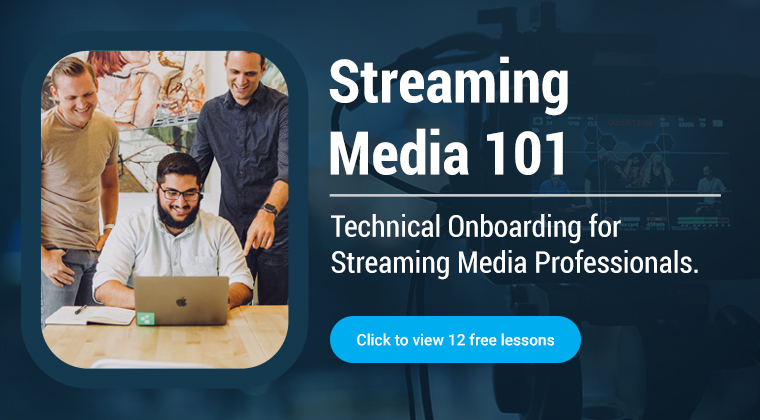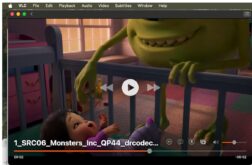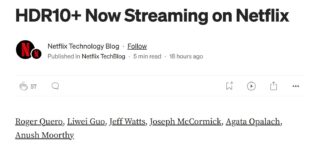I recently tested the Deep Render AI codec and issued a report, which you can read here. The bottom line was that in the tested low-latency use case, the Deep Render AI codec substantially outperformed SVT-AV1 quality-wise and was only slightly behind VVenC. While the codec lacks features like bitrate control that are necessary for most deployments, it offers outstanding integration …
Read More »AV1 vs. VVC Mobile Playback: A Quick and Dirty Test
Streaming Media recently published my article on VVC and AV1, Software Decoding and the Future of Mobile Video. An honest evaluation of the article might observe that while the quality comparisons between SVT-AV1 and VVenC were relatively complete, the article didn’t share any mobile playback performance data. That’s because I couldn’t find any VVC players for testing on either mobile platform. …
Read More »Deep Render: An AI Codec That Encodes in FFmpeg, Plays in VLC, and Outperforms SVT-AV1
While many AI-based codecs are still making their first appearance in white papers, often with tortured playback requirements and no working decoder, the Deep Render codec is already encoding in FFmpeg, playing in VLC, and running on the billions of NPU-enabled devices already in the market. Let’s take a step back. I’ve been following the development of the Deep Render …
Read More »x265 and WPP: What’s Fast Isn’t Always Efficient
If you’re optimizing x265 for speed, enabling Wavefront Parallel Processing (WPP) looks like a no-brainer. Table 1 shows a staggering 7.3x improvement in encoding time. A 3:15 encode with WPP turns into a painful 23:51 without it. The quality penalty? Negligible. VMAF drops just 0.19, with the low-frame VMAF off by only 0.77 (low-frame is the lowest VMAF score of …
Read More »HEVC Licensing: Misunderstood, Maligned, and Surprisingly Successful
I’ve been involved in a seemingly never-ending debate that started with the dubious (to me) concept of blaming Brightcove’s recent layoffs on HEVC licensing practices. The three questions involved are: Was HEVC’s licensing structure an aberration or similar to other technologies? Was HEVC a commercial success despite these licensing practices? Why didn’t non-premium content publishers adopt it? I have strong …
Read More »TV 3.0 and LCEVC: From Standards Win to Real-World Stakes
One of the more intriguing questions surrounding Brazil’s TV 3.0 broadcast upgrade is whether it will help drive LCEVC’s success. LCEVC seems like a technology in need of a tailwind — will TV 3.0 provide it? Alongside VVC, LCEVC is now mandated in receiver devices as part of the spec, which is a significant milestone. But inclusion in a standard …
Read More »Netflix’s HDR10+ AV1: Finally Matching HEVC for Premium Content Delivery
Netflix just announced that it is delivering AV1 video with HDR10+ to certified devices, which means that AV1 has achieved practical parity with HEVC for premium content delivery. This long-awaited announcement, when combined with YouTube’s proprietary HDR support, tends to indicate that there is a critical mass of AV1/HDR10+ capable devices worth addressing. Let’s review the history. Netflix started streaming …
Read More »The Codec Conundrum: Navigating the Challenges of Video Codec Adoption
For years, we’ve heard about the allure of HEVC, AV1, and even VVC, all new video codecs promising better quality and reduced bandwidth. But how do content providers, platforms, and CDNs navigate the complexities of adopting these new technologies? A recent panel discussion at Streaming Media Connect 2025 shed light on this crucial topic, featuring insights from industry leaders. All …
Read More »Sandwiched Compression: Repurposing Standard Codecs with Neural Network Wrappers
The white paper titled “Sandwiched Compression: Repurposing Standard Codecs with Neural Network Wrappers” is authored by a team from Google Research, including notable contributors such as Onur G. Guleryuz, Philip A. Chou, Berivan Isik, Hugues Hoppe, Danhang Tang, Ruofei Du, Jonathan Taylor, Philip Davidson, and Sean Fanello. Their collective expertise in image and video processing, neural networks, and rate-distortion optimization …
Read More »Ateme’s Mickaël Raulet Talks AI Codecs and OTT Contribution at Mile High Video 2025
In this interview from Mile High Video 2025, Jan Ozer from the Streaming Learning Center spoke with Mickaël Raulet, CTO of Ateme, about the company’s latest developments in video delivery and encoding technology. Mickaël shared his insights on emerging trends, including AI-based video encoding, advanced DRM solutions, and the growing adoption of new video codecs. You can watch the interview …
Read More » Streaming Learning Center Where Streaming Professionals Learn to Excel
Streaming Learning Center Where Streaming Professionals Learn to Excel












